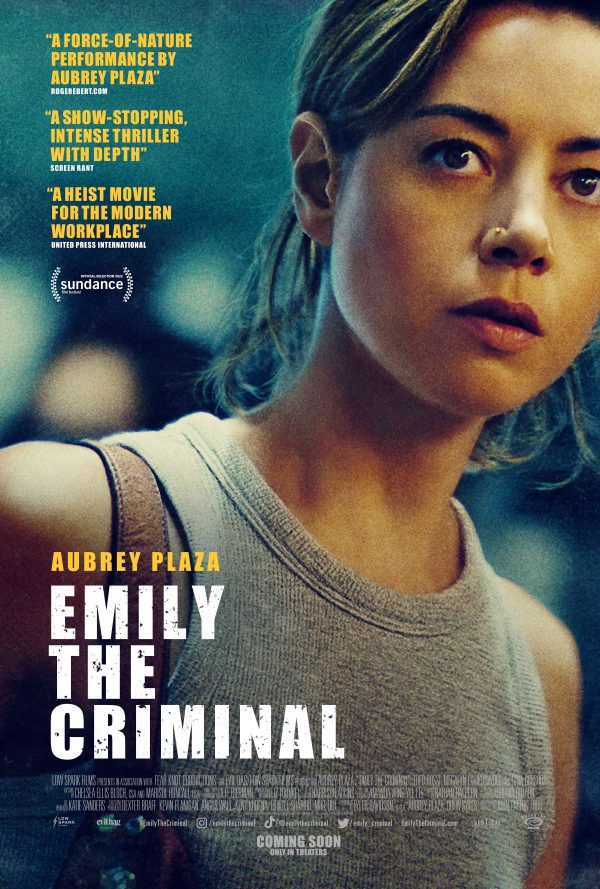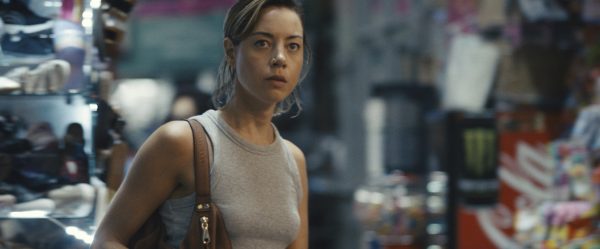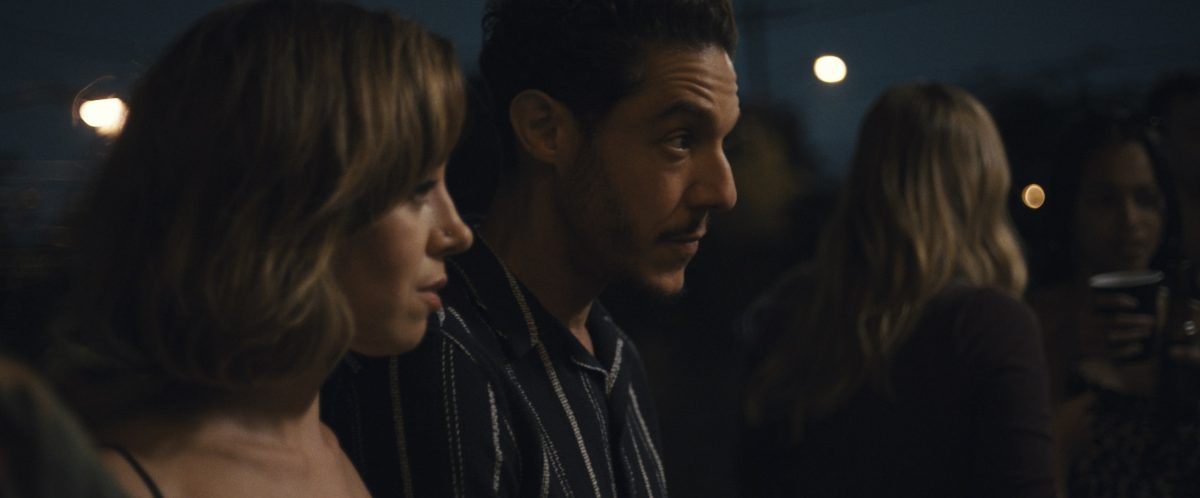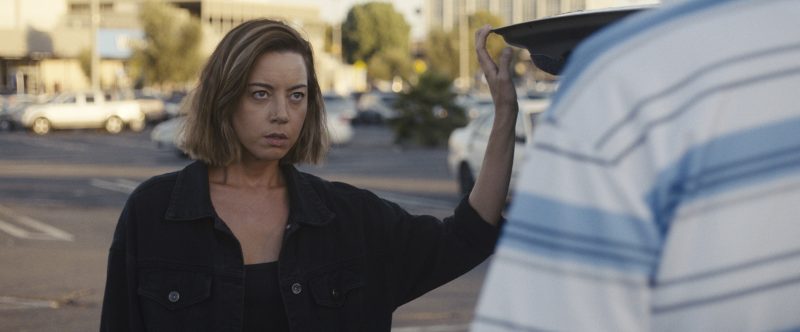
“Emily the Criminal” (2022). Cast: Aubrey Plaza, Theo Rossi, Bernardo Badillo, Jonathan Avigdori, Megalyn Echikunwoke, Gina Gerson, Sheila Korsi. Director: John Patton Ford. Screenplay: John Patton Ford. Web site. Trailer.
Life is full of hard choices, and, fittingly enough, they nearly always materialize during periods of hard times. Still, despite the uncannily synchronous nature and timing of such matters, that doesn’t make them any less challenging to address. And, as much as many of us would rather not deal with such issues, they must be handled, lest we be saddled with even bigger problems to solve. Those solutions may not prove to be adequate or prudent, either, even if they act as stopgap measures to get us through tough times. So it is for a young woman saddled with potentially overwhelming conditions in the new crime drama/character study, “Emily the Criminal.”
Poor Emily (literally). The 27-year-old Los Angeles catering company worker (Aubrey Plaza) is drowning in debt, most notably $70,000 in student loans for an art school degree that she didn’t even finish. And, due to a minor criminal record that mercilessly clings around her neck like a millstone, she’s unable to find a better-paying job due to difficulties with passing background checks. So she struggles to get by just to cover living expenses and interest on her outstanding loans, with the principal on those debts going virtually untouched. She’s trapped on a financial treadmill, and it’s amazing she’s able to carry on.
To her credit, though, Emily makes a sincere, concerted effort to play by the rules in paying off what she owes. She scrambles to generate cash whenever she can and diligently goes on job interviews. She also periodically meets with her longtime friend, Liz (Megalyn Echikunwoke), with whom she grew up and later attended art school. Liz managed to complete her degree and is now comfortably employed, and she makes what appear to be genuine efforts aimed at helping Emily land an internship where she works. But making that happen is easier said than done, given that Emily doesn’t have a sheepskin, despite being only a handful of credits away from completing her degree. Liz’s boss Alice (Gina Gershon) dangles her share of underwhelming carrots before her, but genuine, meaningful promises are hard to come by. So Emily continues to soldier on as best she can, even though the frustration level is constantly being ramped up.
Circumstances change one day, however, when Emily’s co-worker, Javier (Bernardo Badillo), asks her for a favor. She’s initially reluctant to comply with his request, but he makes it worth her while by giving her a lead on how to make a quick $200. So, in return for the tip, she agrees to help him out. However, when Emily texts the number Javier gives her, she’s met with a vague response. She’s simply given an address to show up at the following day if she’s interested, leaving her somewhat unsure of what she’s getting herself into. But the prospect of a quick cash score is enough to convince her to follow through and see what it’s all about.
Upon arriving at the designated address, she’s rushed through a series of interrogations in which she’s pressured to provide information about herself and the source who told her about the lead, all without explanation of what’s going on. After being put through her paces, she and a group of others are then assembled for a “presentation” of what this mysterious opportunity is all about. Stepping up on a makeshift presentation platform is a somewhat shady-looking character who appears to be one of the head honchos of this operation. His name is Yousef (Theo Rossi), and he starts out by letting everyone know that what they’re about to engage in is illegal. He offers them the opportunity to leave if they’re uncomfortable with that, but he also notes that, if they agree to participate, they’ll each get the $200 promised to them. Intrigued, no one leaves, including Emily, all of whom wait on what Yousef has to say.

In essence, Yousef describes his operation as a “dummy shopper” scheme, a credit card scam in which phony credentials are created and used to make purchases of various types of merchandise, such as high-end electronics, that are then resold for cash on the black market. Given that the goods are acquired with counterfeit credit cards (backed up by fake driver’s licenses bearing the names of fictitious individuals), the retailers have no one against whom they can collect on the approved charges, leaving them with no recourse once the “purchased” merchandise leaves their outlets. It’s a practice that, in most instances, allows the dummy shoppers to walk away scot-free – and puts saleable brand name goods in the hands of Yousef and his band of criminals.
When Emily successfully pulls off her first “purchase,” she receives the promised fee. And, given the ease with which she carries out the task, Yousef is impressed with her moxie, offering her an opportunity for an even bigger score the following day. Details of that job are again sketchy, but, considering how easily she was able to get away with her first gig – and the promise of a more lucrative payday – Emily decides to take Yousef up on his offer.
The second heist proves somewhat more problematic, leading Emily into legitimate danger. But, given her financial circumstances, she again manages to rise to the occasion. She discovers she has quite a knack for this kind of work, and she relishes the income it generates. And, the more she does it, the more impressed Yousef becomes. The time it takes away from her catering job leads her to rearrange her work priorities, but, when she assesses the money she’s earning from her respective gigs, it becomes easier for her to alter her routine – and to do whatever it takes to ensure her success in her newfound line of “work.” It also helps that Yousef’s backing starts to turn personal, giving her another reason to change lanes when it comes to making money.
As the stakes are upped, it becomes apparent that Emily is ever more willing to do whatever it takes to reach her financial goals, even if that means resorting to ruthless or underhanded measures. She still claims to be interested in fostering an art-related career, though her passion for it is decidedly waning, especially when the monetary considerations of her new pursuits take precedence. She also feels compelled to zealously rally her support behind Yousef, particularly when he comes under increasing scrutiny from his cousin and partner in crime, Khalil (Jonathan Avigdori), who is beginning to believe that Yousef is growing too powerful, leading to a struggle for control of the operation. And, of course, there’s Emily’s ongoing fiscal crisis, which she still needs to address, despite all of these other conditions.
How will everything shake out? That depends on how far Emily and Yousef are willing to go in light of what they’re up against. A number of high-stakes twists and turns are in play, whose outcomes hold the potential of taking events in some unexpected directions. But, when one’s back is up against the wall, there’s no telling what one is capable of – and what can ultimately result.
When we’re faced with overwhelming circumstances that threaten to undermine our existence, we may panic with what we’re up against. But how are we to deal with such conditions? The feelings of desperation we often experience in scenarios like this could easily consume us, possibly sending us down paths from which there’s no return.

These are times that call for creativity, for thinking outside the box, pushing boundaries and overcoming fears and limitations. These are all challenges in themselves, the particulars of the specific problems we face notwithstanding. And, even if we manage to devise solutions to the issues at hand, they typically won’t do us any good if we don’t believe in their viability. This is where the conscious creation process comes into play, the philosophy that maintains we manifest the reality we experience through the power of our thoughts, beliefs and intents, the building blocks of existence. Should we fail at this, we’re likely screwed; but, if we’re convinced of the veracity of our plans, we stand a good chance of making things work.
Granted, we must take into account that these “solutions” may contain inherent faults of their own. They might solve a problem at hand but, in turn, create other new ones in their wake. Admittedly, this may not be an ideal way to reconcile these matters, but they could help to back us out of a corner – even if they subsequently place us in yet another one. However, if we recognize that resolving these overarching issues is truly a process, we might well put ourselves onto a path that ultimately leads us out of our troubles for good. What we must be sure to do, though, is remain committed to achieving resolution, an undertaking that could require multiple steps involving the fulfillment of multiple manifestations to finally attain the desired result.
That could prove tricky in several respects. To begin with, we may become weighed down by beliefs related to fear, doubt and limitation that could undermine our grander plans, keeping them from materializing as intended – or at all. But, even if we’re able to forestall that potential pitfall, we may erroneously come to believe that devising effective solutions to our challenges is a “one and done” practice. Such thinking fails to take into account the notion that the creation of our existence is, in itself, an ongoing process, one that relies on a series of sequential manifestations that collectively constitute the unfolding of our reality, including all of its components, such as those associated with resolving our challenges. This principle, in fact, helps to define and characterize the very nature underlying this school of thought – that we’re all in a constant state of becoming.
These are the principles that Emily is learning as her odyssey progresses, even if she’s not consciously aware of them. Considering where she begins – as a victim of a rigged system in which she has unwittingly allowed herself to become and remain trapped – she faces a tall order to rid herself of the burdens she’s saddled with. And the more the screws are tightened, the more desperate she becomes to find a way out of her circumstances. However, she gradually learns that she’s not going to be able to free herself by playing by the rules that have kept her stuck. She eventually realizes that, if she’s to escape this cage, she must write her own rules, ones that work to her favor, even if that means going against standard accepted practices.
And, considering what she’s long been up against, many might observe, “Who can blame her?” She’s been held back and taken advantage of in ways that have made it virtually impossible for her to break free and move forward. At the same time, however, one still can’t help but question some of her choices, decisions that could leave her with even bigger problems to solve, with even more dire consequences awaiting her. Her creations might liberate her from her current circumstances, but they could potentially manifest other, more troubling conditions requiring even greater materialization efforts to absolve herself down the road. Her story thus serves up a powerful cautionary tale, one that could help her out in the short run but that could significantly up the ante for the long term. It’s a potentially puzzling conundrum that clearly requires her to pick her solutions – and their underlying thoughts, beliefs and intents – carefully.
All of this raises important issues related to responsibility. As the creators of our existence, we’re the ones responsible for how it unfolds, for better or worse. The choices we make with regard to what we manifest – and how we respond to it – carry consequences for which we are ultimately accountable. We should never lose sight of that, either, especially if we focus on the outcomes of our creations to the exclusion of the side effects that may accompany them, a practice known as un-conscious creation or creation by default.

The impact of such fallacious thinking can be felt in several ways in this story. Emily’s rule-bending actions could work to her benefit, or they could become riddled with hazards that are impossible to recover from. At the same time, those who created the conditions that ensnared Emily in her dilemma also bear some responsibility for how affairs have played out. Those who came up with the rules regarding her loan repayment obligations, her employability prospects and the impact of her criminal record all contributed to creating the circumstances that have made Emily the person she has become. Indeed, responsibility truly cuts both ways; if we wish to avoid the kinds of problems on display here – and, regrettably, in the real world at large these days, too – then efforts must be made on both sides to prevent, or at least mitigate, their emergence in the first place.
Emily’s story should thus serve as a powerful life lesson for those on both sides of table in this scenario. That’s particularly true where it comes to the agendas – and the beliefs underlying them – that have created the conditions present in this all-too-familiar narrative. When looked at logically, it all seems so patently absurd and intrinsically unnecessary. So why do we continue to pursue such avenues of existence? That’s an excellent question, one that maybe we should all ask ourselves a little more often – and decidedly more thoughtfully. To do less, one might argue, would be … criminal.
Given the level of graft, corruption and manipulation in contemporary society, it often seems like the only way to get ahead is to cheat, even if it means breaking the law. The age-old wisdom of working hard, playing by the rules and being fair seems “quaint” to many, especially among many of today’s young adults, who feel as though they’ve been saddled with insurmountable debt from dubious lending practices like those associated with burdening student loans. But what is one to do when the old rules simply don’t work and a new solution is needed to break out of financial bondage?
Those are the questions raised in this taut new thriller about a young woman torn between following her principles and being practical in the face of staggering odds. Writer-director John Patton Ford’s debut feature addresses these issues head-on in a straight-up drama about what desperation can prompt us to do when we feel we’re running out of conventional options. The film provides a positively superb showcase for actress Aubrey Plaza in her award-worthy performance as the beleaguered protagonist, who finds it surprisingly easy to turn to what many older viewers might see as a series of questionable and unethical choices, despite the fact that she often sees no other way out of her circumstances – and the troubling path that they set her on for the future. Some may also see some of the narrative’s developments as a little far-fetched, but one simultaneously can’t help but wonder what we would do if we found ourselves in the title character’s shoes, a notion effectively brought front and center through the film’s writing, acting and direction. This surprisingly thoughtful offering dressed up as a somewhat conventional crime drama makes for an intriguing fusion of genres that will have you on the edge of your seat for its economical and always-engaging 1:37:00 runtime. Don’t sell this one short; it may not be widely known, but it’s well worth a look. The film is currently playing theatrically.
It’s unfortunate that getting square these days often requires a certain degree of getting even. As we move into what we hope will be more enlightened times, hurdles like these need to be overcome. But, if we’re to succeed, we need to take as much of a look at how we set the rules as we do in determining the consequences of breaking them. These decisions indeed represent hard choices for hard times, and the challenges in adjusting them lie with the parties on both sides in these scenarios. The question in this is, “Do we have the will to carry out this task?” Much depends on what we believe and our willingness to follow through on them. We can only hope that we won’t fall back on desperation, criminality or dishonesty to place us in jeopardy or on complacency, excuses or stubbornness that keep us locked in place – or potentially behind bars.
Copyright © 2022, by Brent Marchant. All rights reserved.

No comments:
Post a Comment